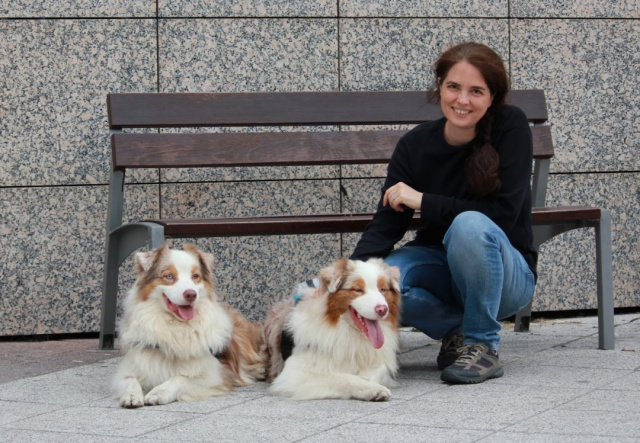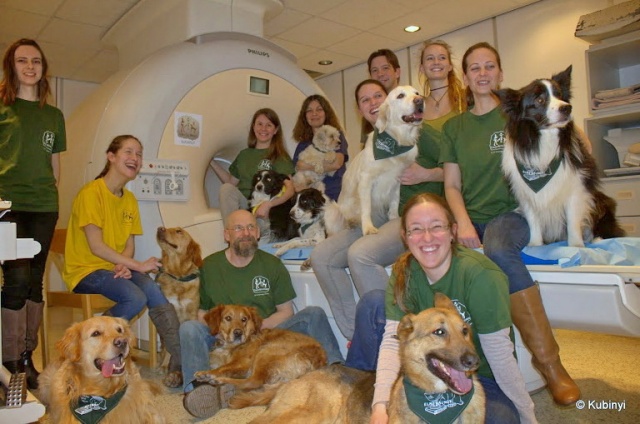Gaining Momentum: Enikő Kubinyi
Fifteen new research group leaders will be able to continue their research in the coming years with the support of the Lendület (“Momentum”) excellence programme of the Hungarian Academy of Sciences (MTA). We present them in our new series. First, Enikő Kubinyi, Senior Research Fellow at the Department of Ethology, Institute of Biology, ELTE Faculty of Sciences, describes her winning grant application to study the evolutionary drivers and consequences of companion animal ownership. Little is known about the impact that an animal treated as a family member has on the social behaviour of humans and how this situation changes the animals themselves. This is an important issue also because these changes are not always positive.
When Enikő Kubinyi had started working on her thesis as a biology student at the Department of Ethology at ELTE University in 1994, she had not known that she would be studying dogs. At that time the department had started research on dog behaviour under the leadership of Vilmos Csányi.
“I didn’t apply to the Department of Ethology to play with dogs, but to do research, because I was extremely interested in animal behaviour. However, I had my own dog, and I began one of my thesis topics with her around, which meant I was able to get involved with the experiments directly, right from the start. So, I’ve been working with dogs for over 25 years now, and in recent years my interests have shifted increasingly towards brain research and genetics. And in this programme,
for the first time, I’d also like to work with sociologists and economists,
which will make the next few years particularly exciting for me,” she said.
What we expect from dogs
Eniko Kubinyi was shocked to learn how many dog owners value their dogs more than people, including family members. In a questionnaire-based survey, sixty per cent of dog owners mostly or completely agreed that their dog was more important to them than any human, and often those with children also said the same.
 Enikő Kubinyi Photo: elteonline.hu
Enikő Kubinyi Photo: elteonline.hu“I was surprised by this result, even if this survey was not representative. I found the phenomenon so interesting that it led to the current Lendület grant application,” Enikő Kubinyi says. “In the research programme, we will investigate
how companion animal ownership affects human societies and animals.
By companion animal ownership we mean a situation where people regard their animals (usually their dogs) as family members.”
What could be the reasons for companion animal ownership? Some theories suggest that modern humans miss the intense social stimulation of large families. The reason is that due to the demographic transition, fewer children are being born and the increased mobility makes contact with relatives even rarer. A cultural runaway phenomenon has therefore begun and people are increasingly demanding the closeness of companion animals. A dog can give you something that you originally got from your relatives: the feeling that someone needs you, with non-judgemental, devoted attention, unconditional love. The question is how this kind of pet ownership affects social relationships and social networks, and what the costs and benefits of dog ownership are. Researchers believe it is important to study not only advantages but also disadvantages.
The research will include a representative survey of what percentage of dogs are actually treated as family members in Hungary – it is assumed that a significant proportion of them live their lives in this way. But most of the world’s dogs can at most only dream of such a position. Eight hundred million dogs live on the planet, eighty percent of them on the streets, with little contact with humans.
Complex relationship
“According to popular belief, dog ownership is very good for people in many ways, from the health of the owner to the development of children. Large-scale research, however, finds virtually no positive effects,” the ethologist continues. “If there is any demonstrable positive effect of dog ownership, studies show that it is only felt in very specific groups, such as elderly people living alone or veterans with post-traumatic stress disorder. Even with assistance dogs, dogs and people need to be carefully selected because not all dogs will work for all people in need.”
So dogs are not a universal cure for people’s social problems. In some cases, in fact, it is the dog that causes these difficulties and the isolation of the owner from other people. According to Enikő Kubinyi, this is an important consequence of dog ownership that is often kept quiet. Yet many people exclude themselves from certain social activities because of their companion animal, making relationships impossible. Depending on the dog’s behaviour, the owner's social contacts may expand, as many people start to make friends with other dog owners with whom they share the same interests.
However, the opposite can also be true.
These examples also demonstrate how complex the relationship between dogs and humans is, how many factors influence it, and how few truly objective studies have been carried out that take all aspects into account (and even go against popular belief). The results of the research programme being launched now will therefore be to fill a gap and break the mould, but it cannot be ruled out that they may also generate controversy.
There are few people who do not have assumptions about or personal experiences with dogs. Surveys have shown that there is virtually no social group whose members do not own a dog, but that there are differences in attitudes. Parents with young children, for example, may spend less time with their dogs because they are more preoccupied with raising their children. But this tends to change when the children grow up and leave the nest; people then become very committed to their dogs and this is when they spend the most money on their pets. In the US, older people spend seventy per cent more money on dogs than people with young children.
Exploring the popularity of short-headed breeds
“A dog very often has the status of a child at home, so it is logical to look at the extent to which owning a dog tends to delay or substitute having children. After all, caring for a dog is cheaper and easier than caring for a small child, while at the same time it gives you many of the things you would expect from a two-year-old child,” Enikő Kubinyi says.
So one part of the grant application is looking at the impact of dog ownership on human social relationships, productivity, and well-being. But the research will mostly focus on dogs since it is clear that their characteristics are also influenced by their family status. And this effect is not necessarily positive, which raises animal welfare issues. There are dogs in which a highly restrictive environment can produce behavioural problems, while breeding for a “childlike” appearance is associated with congenital diseases. In the case of companion animals, there is a strong selection for looks; that is, breeds are bred to appeal to people looking for a family member, for example with big eyes and a snub nose.
 Dogs and researchers Source: Enikő Kubinyi
Dogs and researchers Source: Enikő KubinyiAs a consequence, breeds have appeared that would not be able to survive and reproduce without human care. Typical examples are small, short-nosed breeds (such as bulldogs and pugs), which often need a Caesarean section to be able to give birth – most of them need constant medical treatment and suffer from respiratory problems. Despite these health problems, the popularity of these short-headed breeds continues to grow, with several short-headed breeds featuring among the top ten most popular breeds.
“The secret behind the popularity of these breeds will be a very important question for us. What do these dogs have that other kind of breeds don’t, and how are they fundamentally different from the others?” Enikő Kubinyi asks. “Previously we have found that these dogs can look into your eyes for longer and more easily, presumably because of the way their eyes are positioned and built. We also know that their brains have been very significantly distorted during selection.
In addition to behaviour and cognition, we will further investigate their neuroanatomical features on digitised skulls.
We will explore the changes in gene expression in samples from our Canine Brain and Tissue Bank, established in 2017.”
Not only dogs will be studied, but also other pet species such as cats and rats. The researchers will also look at what proportion of their owners call them family members and, in this context, the characteristics of their relationship with humans and their appearance.
Commenting on the importance of the research, Enikő Kubinyi said: “Companion animal ownership is a huge area of human life and of the economy that also affects non-pet owners. We will provide insights into how animals affect human communities. We will quantify the impact of companion animals on the emotional and mental health of their owners. The impact of selection for childlikeness on animal welfare will be explored by bringing together multiple disciplines. Our research should provide evidence-based knowledge to help inform decisions about animal ownership, thus contributing to improving the quality of life for people and animals.”
ABOUT THE LENDÜLET PROGRAMME
The purpose of the Lendület (“Momentum”) Programme is to strengthen the young researcher based in Hungary by dynamically renewing research conducted at research institutes, universities, public collections, and public institutions, and by keeping top researchers and outstanding young talent in Hungary or attracting them back from abroad.
The Lendület Programme aims to support both excellence and mobility by providing funding for research groups that form at host research centres to research new topics. It provides a way forward for researchers who have already applied successfully for prestigious national and/or international postdoctoral or research grants.
Since 2009, in addition to 162 men, 27 women have set up Lendület research groups, and the percentage of women winners has been above 20 per cent for the last 5 years. Last year this percentage reached 33 per cent, with 5 out of the 15 winners being women.
